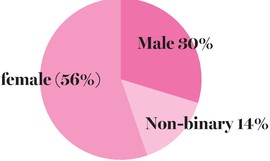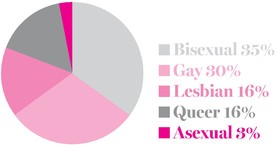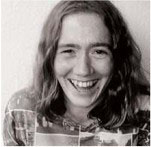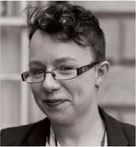Budding Burning Issues
The issues facing Ireland’s LGBT+ young people
Survey analysis by Dr. Chris Noone
The Top 10 Burning Issues for Young LGBT+ People
01
47%
Lack of Acceptance & Understanding
Most young people mentioned that they don’t feel fully accepted in society. Some focused particularly on family, friends or teachers. In general, there was a sense that young LGBT+ people do not feel understood, especially since they see so many people relying on stereotypes instead of actually informing themselves regarding LGBT+ issues.
“Yes things have changed for the better, but are we really a LBGT-friendly country? I’ve seen three LGBT+ couples (excluding Pride) holding hands publicly in my lifetime.”
“Even if society is now for the most part accepting, when there’s no mention of what you identify as, you can feel a bit invisible – which leads to more stress/worry. I’d like to see an Ireland where from the beginning, in schools, both communities, straight and LGBT+, are represented and encouraged and presented as normal.”
“I want more gay bars in rural and urban areas, I’m sick of not being comfortable enough to talk to whoever I want or kiss a boy just because I’m in a club with ‘straight’ people.”
The peak age of respondents is 17 (21%)
Breakdown...
02
39%
Inclusive Sex Education
The next most highlighted issues was the need to overhaul the way our education system approaches sexual and relationship education to ensure it is inclusive of LGBT+ people and issues.
It was acknowledged that sexual education in general is very poor and that straight students would benefit from an improved curriculum. Some young people also highlighted that LGBT+ issues could be included in other subjects too, especially English and History.
“In all my school years there was no same-sex sex talk, no information on coping with realising you’re LGBT+, no representation in school literature whatsoever. That struck me as a major issue because in a school of over 700 students there’s absolutely no way all of them are straight!”
“There is zero LGBT+ education in the Irish education system and this is a serious issue which needs to be fixed. Straight sexual education, which is mediocre at best, is the only sex ed received by Irish students growing up; this leaves young people of the LGBT+ community in the dark and therefore almost totally reliant on the internet to find there own sexual education. An improved sexual education curriculum would help remove the taboo on speaking about LGBT+ issues and as result help many closeted young people to accept themselves as well as hopefully exterminate homophobia from schools and work places.”
Aodh, 18
“In our circles we don’t see much opposition, we’re preaching to the choir, but you don’t realise how many people there are out there who are just really unpleasant towards members of the LGBT+ community. Particularly trans people get a lot of that.”
100% of the 565 respondents live in the Republic of Ireland.
Alexandra, 21
“A lot of the time, when trans people are represented in the media, it’s usually being made fun of, or bullied, or it’s big drama. It’s hard to ind positive representation. That is a struggle that I’ve had. I didn’t really realise I was trans because I didn’t have role models.”
03
27% Lack of LGBT Spaces & Resources
Many young people called for more safe spaces and youth-focused support groups to be made available. Young people want LGBT+ spaces because many of them are feeling isolated and lonely. A quarter of these people specifically mentioned the lack of resources outside Dublin.
It was also mentioned by several young people that they want fun places to meet other young people like them, not just structured supports.
“Coming from a rural area, I feel isolation for young queer people is a topic which needs to be addressed. It was difficult coming to terms with my own sexuality purely because there wasn’t anyone else like me. It wasn’t until I got to college that
I started to deal with it. All my friends from urban areas were exposed to the idea of other sexual and gender identities so could naturally come to terms of it at a younger age. I feel like I’m developing as a person at a much later stage as a result.”
“Particularly outside Dublin, there are very little services for LGBT+ youth... Parents might be supportive, but might ask you to hide your sexuality from extended family and the wider community. All this can be quite isolating and lonely, and can be compounded by lack of access to mental health services.”
“Queer spaces outside of youth groups and Pride, having gay bars open as cafés during the day and establishing a space in each city/county for queer youth to go to that’s accessible and fun to go to, not a counsellor or a youth group.”

How the respondents identify
Harper, 20
“Even on the street and things people can still shout things at you. Like one day in the park I had a rock thrown at my head. I think hate crime legislation is needed, and better education in schools for people around LGBT+ issues, because they don’t really cover that in schools.”
Jack, 19
“I identiied as bi for a few years before I found out what pansexual was, and that just it better. It’s up to us to make sure people are aware of how diverse sexuality is. I know myself sometimes I contribute to it just by allowing people to assume I’m gay or neglecting to tell them that I’m not.”
83% believe that state schools should be separate from religious orders.
04
25% Bullying & Homophobia
Bullying was an important issue for many young people, while many many mentioned the need for hate crime legislation. Several young people highlighted transphobia as being particularly severe, saying more needs to be done to ensure the safety of young LGBT+ people.
“There’s definitely a constant fear for a lot of young people that others perceive to be LGBT+ because of stereotyping etc. will be attacked, intimidated or called various slurs like ‘fag’ or ‘lesbo’.”
“Although schools/colleges/workplaces say that they are against homophobic or transphobic bullying, nothing is actually enforced to stop it from happening.”
“Ireland has no legislation on hate crime, which for a First World country is shocking. Ireland has always lagged behind other countries in social progession but the fact that there is no legislation in place to protect queer young people, as well as people from other backgrounds, is terrible.”
Kai, 18
“You’ve got these strict all-girls and all-boys schools and you’ve got trans kids going into these schools. There’s a complete ignorance and a lack of knowledge about it. Non-binary needs to be recognised as a real gender, and they/them pronouns need to be normalised.”
70% disagree with the statement:
Schools in Ireland today are safe places and are fully inclusive of LGBT students.
05
21% Trans & Non-Binary People’s Rights
A number of issues were highlighted including:
• Gender recognition for under 18s.
• The need for gender neutral bathrooms.
• Access to medical pathway for people who wish to transition.
• Use of correct name and pronouns, especially in schools.
• Employment for trans people
• Recognition of non-binary identities
“The route you have to go just to go on testosterone (I’m speaking on my behalf) is insane. It can take a year just to get informed that you’re on a waiting list, then that waiting list can take years, and if any hindrance or change happens, it screws up, and you have to start again. You need to see maybe two psychologists, who usually turn down people because trans identity is not what they were trained for. Everything is out of place because we’re not that important to others.”
“With regards to PE in school I think that we need an extreme change, firstly with regards to changing rooms. There are so many people who experience gender dysphoria (if that’s the right term) because of where they’re put, and, speaking for myself, it’s very hard to be in a room full of people who judge you constantly and who make you feel unsafe.”

How do you identify your sexuality?
Of the 48 people who chose ‘Other’, 56% identi ed as pansexual
Jade, 18
“I’ve had about 15 classes in sex education and none of them even touched on anything to do with queer. There was even on one occasion a joke thrown in about gay sex. There have been talks at my school too about bullying, but none of them touched on bullying queer people. On Stand Up! week I had to go to my principal to tell them to put the posters up.”
Emer, 18
“I dress in very feminine clothes, and a lot of people think, I can’t be gay because I do. I’ve done the whole annel shirt and undercut thing and I’ve done the whole fairy princess thing; I prefer being the lesbian in the fairy princess dress.”
06
19% Mental Health
Mental health difficulties were linked to the stigmatisation of LGBT+ identities, the difficulty in coming to terms with one’s own identity and the lack of access to inclusive mental health services. The prohibitive costs of mental health care were often mentioned.
“Substance abuse and mental health problems are rampant among gay guys, I don’t think I know any gay guys who haven’t had serious mental health problems.”
“Mental Health is definitely a huge problem in the queer community and especially so for queer youth. It doesn’t help that there is a huge stigma around mental health in Ireland and not enough resources allocated to mental health, let alone queer mental health.”
Emily, 22
“We need more trans acceptance with access to the medical aspects of transitioning. We have two endocrinologists who work with trans people in the country, one in Galway and one in Dublin. The waiting lists are massive and there’s a lot of gate keeping. Even more than trans acceptance there has to be proper access to transition related health care.”
07
13% Health
The main issues mentioned here were:
• Sexual health
• Repeal of the Eighth Amendment
• Drug and alcohol abuse
• PrEP
• Blood donation
“At the moment, the Eighth Amendment is the biggest issue for us. Despite the fact it doesn’t affect us all, it is a discriminatory law that affects so many in our country and repealing it is something the majority of young people are passionate about.”
“[We need] more medical professionals (doctors, counsellors, psychiatrists) equipped to deal with queer issues.”
Emily, 18
“I think any trans issue should be at the forefront of LGBT+ discussions at the moment. We’ve come a long way with the gay and lesbian side of things, but the trans community has been a bit le behind. There’s not a lot of information or education out there about trans people, trans issues, what is wanted and needed.”
Frankie, 18
“I get a lot of hate from my family and a few close people, who say that I’m making the whole non-binary thing up and it doesn’t exist, that there’s only man and woman. I think more should be taught about non-binary people in schools”
08
13% Diversity within the LGBT+ Community
The need to practice radical inclusivity within our own community was an important issue for many young people. Bisexual young people tended to report not feeling accepted or taken seriously by the LGBT+ community, while a general lack of understanding of gender diversity and trans issues was identified.
“Put simply a large part of the community are, shall we say, unwelcoming towards those outside of the main LGBT groups or those who aren’t ‘out’. Even then bisexuals have been told they ‘don’t count’ if they are in a male/female relationship… The resounding attitude is that you have to prove that you have been discriminated against and marginalised in order to be apart of the LGBT+ community, but isn’t that what everyone is fighting for? For people to not be treated badly for who they are?”
“Biphobia is a huge deal, especially when most of the people who make up the LGBT+ spectrum are bisexual and that we also get a lot of scrutiny from both straight and LGBT+ people.” “Bi-erasure is a very real thing. People are told to pick a side or that they’re just saying they’re bi for attention. It’s wrong and disgusting.”
Coming Out
13 % of respondents came out before the age of 13. The majority (23%) came out aged 15, while just 5% came out a er the age of 20.
LGBT+
LGBT+ is the preferred description of our rainbow community, with a vast majority of 67% choosing it. ‘Queer’ came low down on the scale at 7%.
QUEER
Amy, 19
“Repeal of the Eighth Amendment is an intersectional issue, and I think it’s very important that it’s something we focus on in terms of solidarity. As a queer woman, that matters a lot to me. Whether you are a woman or not, whether or not you have a uterus, whether or not you have any kind of relationship with women your
life, it’s something that in terms of solidarity we can recognise from the perspective of an oppressed people. There’s a lot of misinformation out there, a lot of red herrings, the same kind of attacking of people that we saw during the marriage referendum.
With the growing global divide between left and right, you see young people becoming more politically aware. I’d like to see more mobilisaiton around the Eighth. We need to be out canvassing now, we need to get ourselves together in terms of what kind of campaigns we’re going to be running. I think we have a great chance of winning it.”
The 8th
85% of respondents say they would vote to repeal the eighth amendment, while 5% said they would vote No.
(10% didn’t know or had no opinion.)
NO
Are there enough supports in your local area?
09
12% Fear of Coming Out
Many young people described their fear of coming out. Their fears mostly related to being afraid of rejection by family and friends, experiencing discrimination at school and feeling uncomfortable in expressing their sexuality in public.
“I think its the fear of coming out, you know the fear of being judged and not accepted by someone you care about.”
“We’re afraid to come out. Our schools are not a welcome environment for queer youth, even if they try to be. In my school, girls use ‘gay’ all the time to mean crap or bad. It’s hard to keep your hopes up.”
Luke, 19
“The most important issue facing young LGBT people at the moment is lack of education. I think there are a lot of areas that need to be covered, such as sex education, awareness of the di erence between sex and gender, the di erence types of attractions for asexuals – I think that’s very stigmatised at the moment.”
Maisie, 18
“I’m non-binary and I get people telling me I’m faking it, and that they won’t use they/them pronouns because they’re not grammatically correct. I’ve gotten people on the street telling me they want me to die because I look gay, people calling me dyke on the street, homophobia is still there. Our biggest challenge in the LGBT+ community is still about educating people about our lives.”
10
7% Role Models & Representation
Accoring to respondents, there aren’t enough role models in daily life or in the media.
“I’d so love to see some characters on Irish television that aren’t just good looking gay men, or stereotypical lesbians. There’s so much diversity in Irelands LGBT+ community and that deserves to be shown on media just as much as hetero/cis portrayal.”
Rae, 20
“I still think there’s a toxic masculinity problem the gay and bi communities. As a bisexual woman a lot of guys will think I’m up for a threesome or I’m polyamorous, but I’m not. I nd with lesbianism and women who love women, it’s very over sexualised for men.”
OPINION: Dan Reade

Gender Fluidity
Some days I feel more feminine and some days I feel more masculine, and the world should just be able to accept that.
I still remember the day I wore make-up out of the house for the first time. All I was wearing was the tiniest bit of concealer to cover some redness on my face. It was hardly noticeable, but to me it felt like I had painted my whole face bright orange. Covering my face with a hood, I was so worried about what people might think.
I’ve had a lot of time over the past year to figure out who I want to be. Starting to experiment with make-up was a huge thing for me. I’d steal my sister’s and practice for hours, and it’s like I turned into a different person. I felt myself.
Slowly but surely I started wearing more make-up when I was going out. Yes, I got the odd stare, but I didn’t care. A wise man once told me: “What people think of you is none of your business.” Every time I walk outside I just think of that and now if people stare it makes me more confident. Instead of thinking it’s something bad I look at the other possibilities. I take it as a compliment. That’s all I can do.
I started to become more confident in myself and wanted to use more outlets to express myself, so it wasn’t long before
I started experimented with different styles of clothes. I started by ordering things online, whatever I thought I’d feel comfortable wearing. The first thing I ordered was a jumpsuit. It took me several orders to find the right size that was suitable to my body type, but I got there in the end. I remember my mum’s face when I showed her what I had ordered. I also remember her face when I proved her wrong. I was over the moon with it. Some things look amazing; some things might not. It’s a learning process.
Along with these interests came other difficulties. Difficulties that I shouldn’t even have to point out, but I will. Everyone should be accepted for who they are. If I want to wear a dress every single day, I should be able to. But I’m not, because of gender roles. Some days I feel more feminine and some days I feel more masculine. On the days where I do feel more feminine, I should be able to express myself in any way I please, without the worry of staring eyes or being called names.
If your parents don’t get you or your friends don’t get you, I get you and I accept you. Be whoever you want to be because life is to short. The world is changing but it will take time. All anyone wants in the world is to walk outside their houses without being judged. So, while we wait for that day to come, my advice is to just keep living and being yourself.
Dan Reade is 15 years old. He’s a member of Soar, a collective movement which believes that there is greatness within all young people,
www.soar.ie
OPINION: Chris O’Donnell

Mental Health
Lack of acceptance is the number one issue identi ed by young LGBT+ people, and it’s causing major mental health problems.
Marriage equality marked a joyous union between gay, straight, and all things queer in Ireland. The atmosphere in the RDS as the votes were being counted was electric. Seas of beaming faces in Yes Equality t-shirts; tears; hugging strangers with Yes badges… yet we sometimes forget about the 38% who actually voted No. That’s a lot of people. 734,300, to be precise. And that’s what our young people are up against as they come to grips with their own sexualities and gender identities in a sea of conflicting attitudes and opinions.
Anxiety is coming to play an increasingly central role in the lives of our LGBT+ young people. As BeLonG To point out on their website, self-harm is a massive issue in this regard. What’s causing this rapid rise in self-harm and social isolation? It’s the same bullshit the LGBT+ community has always had to deal with – lack of acceptance. Of course in 2017 it comes in its own unique neoliberal guise – lack of acceptance in the face of overwhelming stigma and prejudice from all generations; bullying (both on and offline), and a sometimes an overwhelming sense of loneliness that’s compounded by social media.
In psychiatric circles, it’s recognised that LGBT+ young people fall into a pattern of refusing to attend school around the transition year mark. Perhaps it’s simply the age at which we start to come to terms with our own sexuality; perhaps it’s exposure to more unstructured time that leaves room for more self-reflection. Perhaps it’s bullying. Whatever the cause, our young people are facing a double whammy of coming out both at home and in the school/work environment, which is driving many of them into pits of unbearable self-doubt and social uncertainty.
There are so many complexities in young LGBT+ identity that loss of control can also be felt on a seismic scale. As teenagers wade the treacherous waters of prejudice and stigma, emotions like sadness and anger can become so internalised that they become played out on a pathological level through mental health illnesses like eating disorders and OCD. Of course this can happen to any young person, but few communities are as vulnerable as our LGBT+ youths. We have to be vigilant and supportive where we can; encourage young people to express themselves clearly and with intent, and most of all – engage. Suffering in silence is the most isolating experience of all, leading to depression and anxiety. Only through giving the pain a safe space to be expressed can we hope to deconstruct it
OPINION: Aoife O’Riordan

Identity Politics
So what if some young people switch between identities, using one as a kind of stepping stone towards something else?
I’m sometimes asked what I think of young people passing through our bi+ community, people who think they might be bi+ but who discover later that that’s not quite true for them; others who know that they’re something other than bi+, but who feel that bisexuality might be a safer identity for them to try out – a stepping stone.
I think I’m expected to be annoyed because people should make their minds up, or because everyone should have the courage to step out as exactly who they are. Maybe some eye-rolling is expected, because they think I might say these young people are fuelling the myth that bisexuality is a phase, making bi+ lives harder.
They’re wrong.
Everyone who thinks that they might be bi+, or that bisexuality might be a refuge, is welcome in the bi+ community. Some people find a home in a bi-spectrum identity, and others only stay awhile. I wish them well. I’m glad we could be there for them.
I’d be a hypocrite to say anything else.
Lucky to grow up with parents who had buckets of gay friends, I still didn’t know that bisexuality was an option until I hit 16. Once I figured it out? I was a kid in the greatest candy store.
But soon it became clear that the gay world didn’t embrace my bisexuality with the same enthusiasm. I heard time and again that bisexuals were only there for attention. That if I really liked women, I’d come out ‘properly’ – as gay.
So, I did. It was a safer place for me to be. A couple of years later a man turned my eye for a while and I’ve been happily out as bi ever since. But just as bisexuality does for some, gayness gave me a safe space to be until I was able to cast aside what others might think of me.
It’s scary to admit we can’t control how we change throughout our lives. We build walls around our identities, especially the ones we’ve had to fight tooth and nail for. We forget that we’re here because, one day, love and desire dragged us from where we wanted to go to where we needed to be, and we can’t stop that happening again.
We all change throughout our lives in ways that we can’t predict. We owe it to ourselves, as well as to the young people coming into our community, to embrace that.